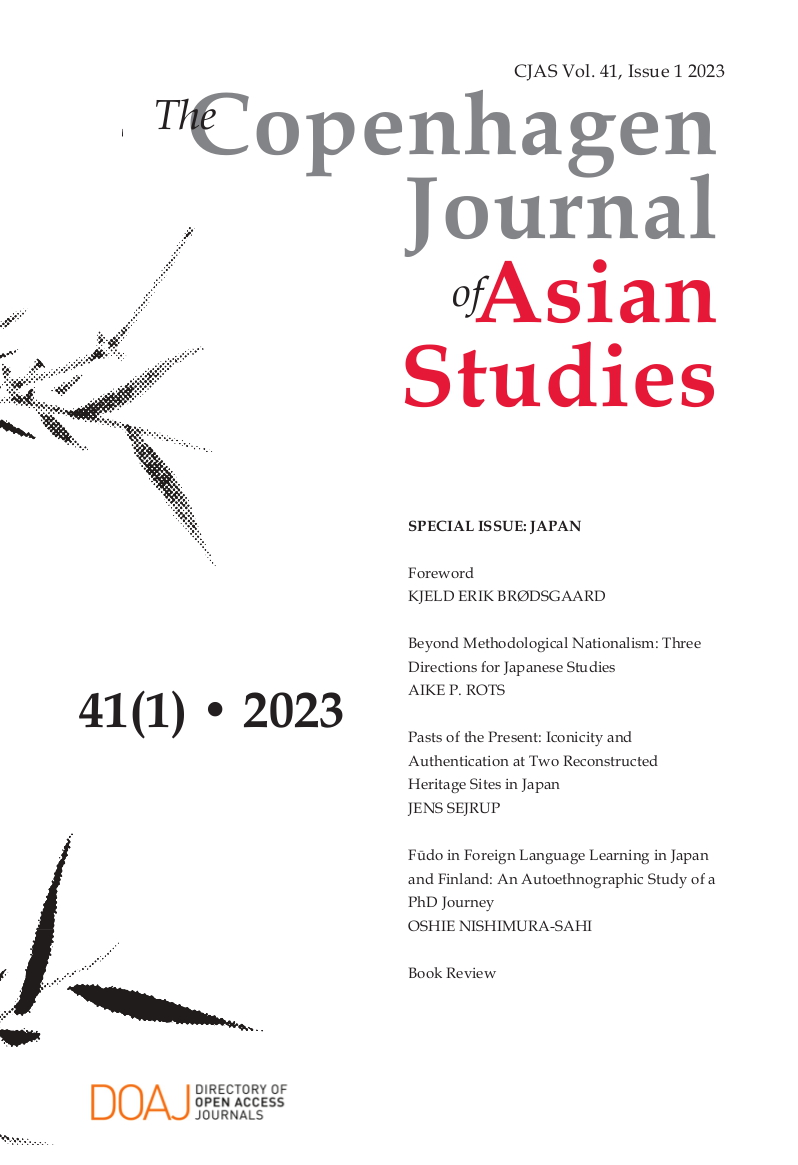Pasts of the Present
Iconicity and Authentication at Two Reconstructed Heritage Sites in Japan
DOI:
https://doi.org/10.22439/cjas.v41i1.6885Keywords:
cultural heritage, historical reconstruction, Nagasaki, Nara, place branding, urban developmentAbstract
In light of today’s global boom in landmark architecture, urban megaprojects and reconstructions of cultural heritage buildings, this paper analyses two large-scale reconstruction projects at iconic historical locations in Japan: the Heijō Palace in Nara and Dejima in Nagasaki. Since the 1990s, the two projects have recreated long-lost built environments, gradually transforming the sites, turning them into museums and exhibition spaces and giving rise to thorough reform of the surrounding urban fabric. In this paper I trace the involved agents’ motivations to engage in historical reconstruction from early-phase experimental efforts to legitimise the sites’ protected status to present-day politico-economic mobilisations of important historical locations to boost city attraction values. In this way, I link these two unfolding projects in Nara and Nagasaki to issues of urban boosterism, heritage production and the facilitation and commodification of tourist experiences of past realities. Approaching the reconstructions as contemporary heritage in traditional guise, the paper argues that both sites revolve materially, spatially and thematically around the master-metaphors of flow, growth and intercultural connectivity that characterise the present age. Elucidating processes of authentication and intersections of ideological and economic interests in and around the two sites, the paper asks in what ways Japanese cities exploit lost iconic localities and reconstructed heritage under post-industrial conditions marked by globalisation and intense cultural-economic competition.
References
Aoki, Yūsuke 2006. ‘Heian Jingū: Mozō to fukugen no hazama de’ (Heian Shrine: In-between Imitation and Reconstruction). In H. Suzuki (ed.) Fukugen shisō no shakaishi (The Social History of the Idea of Reconstruction). Tokyo: Kenchiku Shiryō Kenkyūsha, pp. 108-119.
Benesch, Oleg and Ran Zwigenberg 2019. Japan's Castles: Citadels of Modernity in War and Peace. Cambridge: Cambridge University Press.
Brumann, Christoph 2008. ‘Copying Kyoto: The Legitimacy of Imitation in Kyoto’s Townscape Debates’. In R. Cox (ed.) The Culture of Copying in Japan: Critical and Historical Perspectives. London: Routledge, pp. 213-238.
Brumann, Christoph 2021. The Best We Share: Nation, Culture and World-Making in the UNESCO World Heritage Arena. New York: Berghahn.
Ehrentraut, Adolf W. 1995. ‘Cultural Nationalism, Corporate Interests and the Production of Architectural Heritage in Japan’. Canadian Review of Sociology and Anthropology 32 (2): 215-242.
Fukuda, Mihō 2017. ‘“Repair by Disassembly” (Jap. Kaitai Shūri) in Japan’. In K. Weiler and N. Gutschow (eds.), Authenticity in Architectural Heritage Conservation: Discourses, Opinions, Experiences in Europe, South and East Asia. Basel: Springer, pp. 247-260.
Gfeller, Aurélie É. 2017. ‘The Authenticity of Heritage: Global Norm-Making at the Crossroads of Cultures’. American Historical Review 122 (3): 758-791.
Hendry, Joy 2000. The Orient Strikes Back: A Global View of Cultural Display. Oxford: Berg.
Iwabuchi, Koichi 2002. Recentering Globalization: Popular Culture and Japanese Transnationalism. Durham: Duke University Press.
Jones, Paul 2009. ‘Putting Architecture in its Social Place: A Cultural Political Economy of Architecture’. Urban Studies 46 (12): 2519-2536.
Lincicome, Mark 2020. ‘The UNESCO World Heritage Convention and Japan’s Pursuit of International Cultural Legitimacy’. Japanese Studies 40 (1): 1-20.
Macdonald, Sharon 2013. Memorylands: Heritage and Identity in Europe Today. London: Routledge.
MacLeod, Suzanne 2013. Museum Architecture: A New Biography. London: Routledge.
McMorran, Chris 2008. ‘Understanding the “Heritage” in Heritage Tourism: Ideological Tool or Economic Tool for a Japanese Hot Springs Resort?’ Tourism Geographies 10 (3): 334-354.
Mager, Tino 2015. ‘Introduction: Selected Pasts, Designed Memories’. In T. Mager (ed.), Architecture RePerformed: The Politics of Reconstruction. Farnham: Ashgate, pp. 1-17.
Morris, Martin N. 1999. ‘From the Ground Up: The Reconstruction of Japanese Historic Buildings from Excavated Archaeological Data’. Japan Review 11: 3-30.
Nao, Nobuhide 2006. ‘Hōhō to shite no fukugen: Kankō toshi no machi-zukuri’ (Reconstruction as Method: Creating Tourist Cities). In H. Suzuki (ed.) Fukugen shisō no shakaishi (The Social History of the Idea of Reconstruction). Tokyo: Kenchiku Shiryō Kenkyūsha, pp. 168-179.
Okamura, Katsuyuki and Robert Condon 1999. ‘Reconstruction Sites and Education in Japan: A Case Study from the Kansai Region’. In P.G. Stone and P.G. Planet (eds.) The Reconstructed Past: Experimental Archaeology, Education and the Public. London: Routledge, pp. 63-75.
Sejrup, Jens 2019. ‘Unrealizations: The Making and Unmaking of Two Japanese-designed Extensions to European Museums’. International Journal of Cultural Studies 22(6): 823-843.
Sklair, Leslie 2010. ‘Iconic Architecture and the Culture-ideology of Consumerism’. Theory, Culture & Society 27(5): 135-159.
Sklair, Leslie 2012. ‘Iconic Architecture in Globalizing Cities’. International Critical Thought 2(3): 349-361.
Skot-Hansen, Dorte 2019. ‘The Museum as Destination: The Role of Iconic Museums in Urban Boosterism’. Nordisk Museologi 1: 51-64.
Stanley-Price, Nicholas 2009. ‘The Reconstruction of Ruins: Principles and Practice’. In A. Richmond and A. Bracker (eds.), Conservation: Principles, Dilemmas and Uncomfortable Truths. Oxford: Elsevier, pp. 32-46.
Tseng, Alice Y. 2015. ‘Refracted Copies of the Imperial City and the Great Audience Hall in East Asia’. In T. Mager (ed.) Architecture RePerformed: The Politics of Reconstruction. Farnham: Ashgate, pp. 97-115.
Tsing, Anna 2000. ‘The Global Situation’. Cultural Anthropology 15(3): 327-360.



